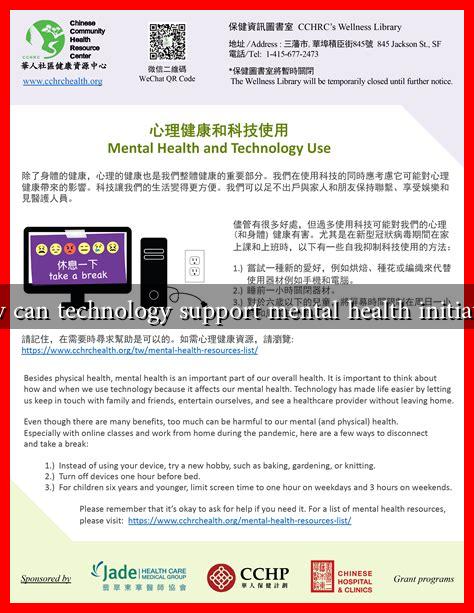-
Table of Contents
How Can Technology Support Mental Health Initiatives?
In recent years, the intersection of technology and mental health has gained significant attention. As mental health issues continue to rise globally, innovative technological solutions are emerging to support mental health initiatives. From mobile applications to teletherapy, technology is transforming how individuals access mental health resources, making them more accessible and effective. This article explores various ways technology supports mental health initiatives, backed by research, case studies, and statistics.
The Rise of Teletherapy
Teletherapy, or online therapy, has become a vital resource for individuals seeking mental health support. The COVID-19 pandemic accelerated the adoption of teletherapy, as many people were unable to access in-person services. According to a report by the American Psychological Association, 76% of psychologists reported using telehealth during the pandemic, with many planning to continue its use post-pandemic.
- Accessibility: Teletherapy breaks geographical barriers, allowing individuals in remote areas to access mental health services.
- Convenience: Clients can attend sessions from the comfort of their homes, reducing the stigma associated with visiting a therapist’s office.
- Flexibility: Teletherapy offers flexible scheduling, making it easier for individuals with busy lives to seek help.
For example, platforms like BetterHelp and Talkspace have gained popularity by connecting users with licensed therapists through video calls, messaging, and phone calls. These platforms have reported significant increases in user engagement and satisfaction, demonstrating the effectiveness of teletherapy in addressing mental health needs.
Mobile Applications for Mental Health
Mobile applications have emerged as powerful tools for mental health management. These apps provide users with resources to track their moods, practice mindfulness, and access therapeutic exercises. A study published in the journal Psychological Medicine found that mental health apps can significantly reduce symptoms of anxiety and depression.
- Mood Tracking: Apps like Daylio allow users to log their moods and activities, helping them identify patterns and triggers.
- Mindfulness and Meditation: Applications such as Headspace and Calm offer guided meditations and mindfulness exercises to promote mental well-being.
- Cognitive Behavioral Therapy (CBT): Apps like Woebot use AI to deliver CBT techniques, providing users with immediate support and coping strategies.
These applications not only empower users to take charge of their mental health but also provide valuable data for mental health professionals to tailor their approaches.
Online Support Communities
Technology has also facilitated the creation of online support communities where individuals can share their experiences and seek advice. Platforms like Reddit and Facebook host numerous groups dedicated to mental health topics, allowing users to connect with others facing similar challenges.
- Peer Support: Online communities provide a sense of belonging and understanding, which can be crucial for individuals feeling isolated.
- Anonymity: The ability to remain anonymous can encourage individuals to share their struggles without fear of judgment.
- Resource Sharing: Members often share helpful resources, coping strategies, and personal stories that can inspire others.
Research indicates that peer support can significantly improve mental health outcomes, making these online communities an essential component of modern mental health initiatives.
Data Analytics and Mental Health
Data analytics plays a crucial role in understanding mental health trends and improving service delivery. By analyzing data from various sources, mental health organizations can identify patterns and allocate resources more effectively. For instance, the use of predictive analytics can help identify individuals at risk of developing mental health issues, allowing for early intervention.
- Population Health Management: Organizations can use data to monitor the mental health of specific populations and tailor interventions accordingly.
- Program Evaluation: Data analytics can assess the effectiveness of mental health programs, leading to continuous improvement.
- Resource Allocation: By understanding community needs, organizations can allocate resources where they are most needed.
Conclusion
Technology is revolutionizing the landscape of mental health initiatives, making support more accessible, personalized, and effective. From teletherapy and mobile applications to online communities and data analytics, the integration of technology into mental health care is proving to be a game-changer. As we continue to navigate the complexities of mental health, embracing these technological advancements will be crucial in fostering a healthier society.
For more information on mental health resources and technology, visit NAMI.


